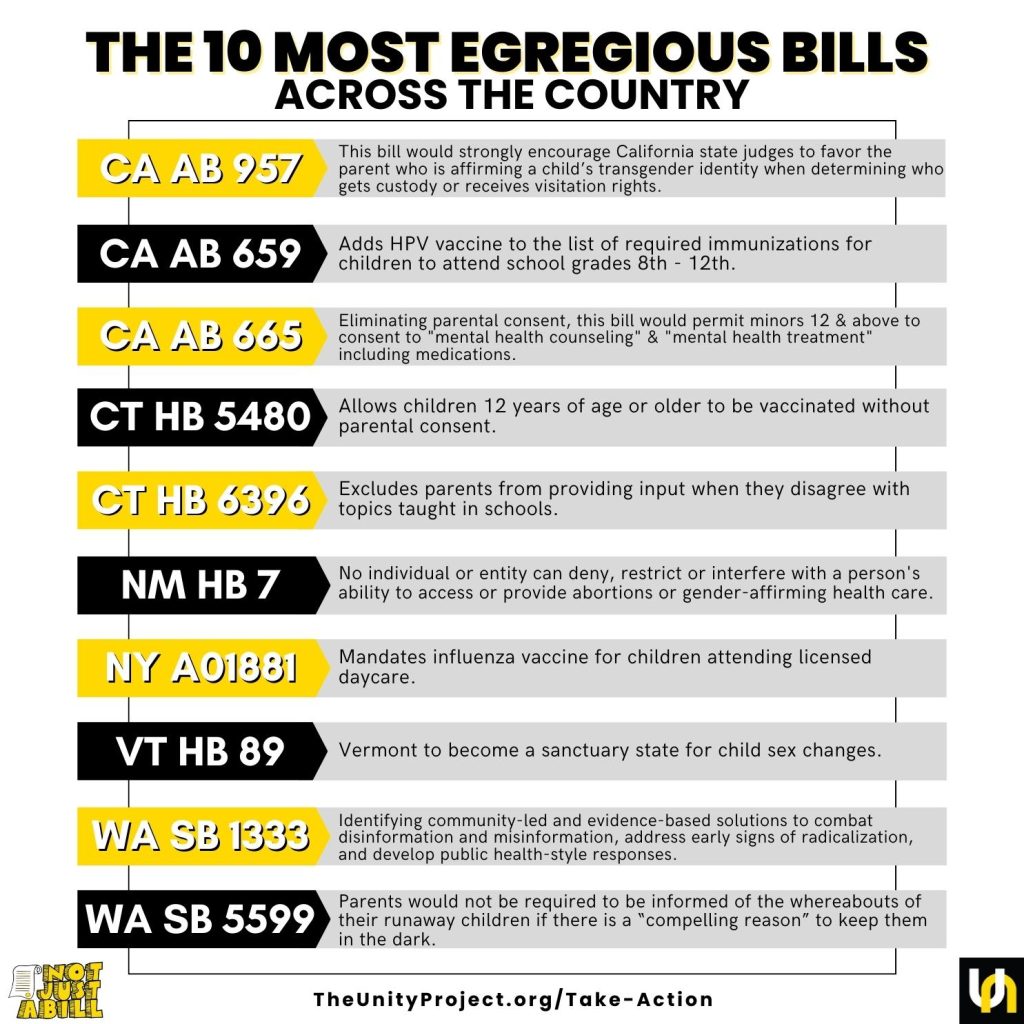Did You Know?
Facts, Data and Talking Points
Adolescent brains are not fully formed, cannot make or consent to medical decisions, states The National Institute of Mental Health (NIMH), part of the National Institutes for Health (NIH)
- According to the NIH, adolescence is an important time for brain development.
The brain finishes developing and maturing in the mid-to-late 20s. The part of the brain behind the forehead, called the prefrontal cortex, is one of the last parts to mature. This area is responsible for skills like planning, prioritizing, and making good decisions. https://www.nimh.nih.gov/health/publications/the-teen-brain-7-things-to-know
- According to the NIH, brain development is related to social experiences during adolescence.
Changes to the areas of the brain responsible for social processes can lead teens to focus more on peer relationships and social experiences. The emphasis on peer relationships, along with ongoing prefrontal cortex development, might lead teens to take more risks because the social benefits outweigh the possible consequences of a decision.
https://www.nimh.nih.gov/health/publications/the-teen-brain-7-things-to-know
- According to the NIH, mental illnesses may begin to appear during adolescence.
Ongoing changes in the brain, along with physical, emotional, and social changes, can make teens more likely to experience mental health problems. The fact that all these changes happen at one time may explain why many mental illnesses—such as schizophrenia, anxiety, depression, bipolar disorder, and eating disorders—emerge during adolescence.
https://www.nimh.nih.gov/health/publications/the-teen-brain-7-things-to-know
- According to the NIH, teen brains may respond differently to stress.
Because the teen brain is still developing, teens may respond to stress differently than adults. This could increase teens’ chances of developing stress-related mental illnesses such as anxiety and depression. Recognizing possible triggers and practicing effective coping techniques can help teens deal with stress. Learn more about managing stress.
https://www.nimh.nih.gov/health/publications/the-teen-brain-7-things-to-know
- According to the NIH’s National Library of Medicine, Children (typically under 17) cannot provide informed consent. As such, parents must permit treatments or interventions. In this case, it is not termed “informed consent” but “informed permission.”
https://www.ncbi.nlm.nih.gov/books/NBK430827/
Drag Shows for Minors is Child Sexual Abuse, as defined by the Centers for Disease Control (CDC)
According to the CDC, child sexual abuse refers to the involvement of a child (person less than 18 years old) in sexual activity that violates the laws or social taboos of society and that he/she:
- does not fully comprehend
- does not consent to or is unable to give informed consent to, or
- is not developmentally prepared for and cannot give consent to
https://www.cdc.gov/violenceprevention/childsexualabuse/fastfact.html
According to the CDC, experiencing child sexual abuse can affect how a person thinks, acts, and feels over a lifetime. This can result in short- and long-term physical, mental, and behavioral health consequences.
What are the consequences?
Examples of physical health consequences include:
- sexually transmitted infections (STIs)
- physical injuries
- chronic conditions later in life, such as heart disease, obesity, and cancer
Examples of mental health consequences include:
- depression
- posttraumatic stress disorder (PTSD) symptoms
Examples of behavioral consequences include:
- substance use/misuse, including opioid misuse
- risky sexual behaviors, meaning sex with multiple partners or behaviors that could result in pregnancy or STIs
- increased risk for perpetration of sexual violence
- increased risk for suicide or suicide attempts
According to the CDC, experiencing child sexual abuse can increase a person’s risk for future victimization. For example, recent studies have found:
- Females exposed to child sexual abuse are at 2-13 times increased risk of sexual violence victimization in adulthood
- People who experienced child sexual abuse are at twice the risk for non-sexual intimate partner violence
https://www.cdc.gov/violenceprevention/childsexualabuse/fastfact.html
According to the CDC, adults are responsible for ensuring that children have safe, stable, nurturing relationships and environments.
https://www.cdc.gov/violenceprevention/childsexualabuse/fastfact.html
COVID vaccines don’t work, mandates are pointless, and risks outweigh the benefits in children, according to the CDC
- According to CDC, vaccinated people are not less infectious than unvaccinated people.
Vaccinated people acquire and transmit COVID-19 just as easily and as often as unvaccinated people.
https://www.cdc.gov/coronavirus/2019-ncov/science/science-briefs/fully-vaccinated-people.html
- According to CDC, COVID-19 vaccines do not prevent transmission
The shots were not tested to prevent infection or transmission and the drug companies don’t claim they do.
www.cdc.gov/coronavirus/2019-ncov/science/science-briefs/fully-vaccinated-people.html
- According to CDC, the death rate for children under 19 from COVID-19 is statistically 0%.
https://covid.cdc.gov/covid-data-tracker/#datatracker-home
- According to CDC & FDA, COVID vaccines pose risks of myocarditis, blood clotting, neurological damage and death to name a few, predominantly in adolescents.
https://www.cdc.gov/coronavirus/2019-ncov/vaccines/safety/adverse-events.html
Sharing vaccine and medical records is a HIPPA violation, per the CDC
- According to the CDC, the Health Insurance Portability and Accountability Act of 1996 (HIPAA) is a federal law that required the creation of national standards to protect sensitive patient health information from being disclosed without the patient’s consent or knowledge.
- According to U.S. Department of Health & Human Services (HSS), the HIPAA Privacy Rule, Only you or your personal representative has the right to access your records.
https://www.cdc.gov/phlp/publications/topic/hipaa.html
Health care providers have legal obligation to give informed consent, per NIH
- According to the NIH, Informed consent is the process in which a health care provider educates a patient about the risks, benefits, and alternatives of a given procedure or intervention.
- Informed consent is both an ethical and legal obligation of medical practitioners in the US and originates from the patient’s right to direct what happens to their body.
- Implicit in providing informed consent is an assessment of the patient’s understanding, rendering an actual recommendation, and documentation of the process.
https://www.ncbi.nlm.nih.gov/books/NBK430827/
According to the American Civil Liberties Union (ACLU), the government cannot penalize you for your religious beliefs.
The First Amendment of the U.S. Constitution says that everyone in the United States has the right to practice his or her own religion, or no religion at all.


